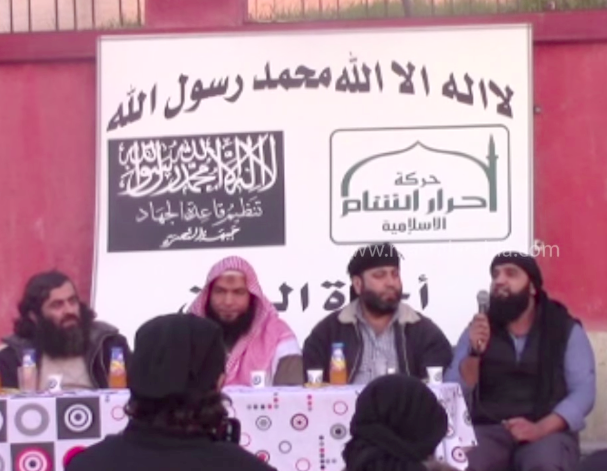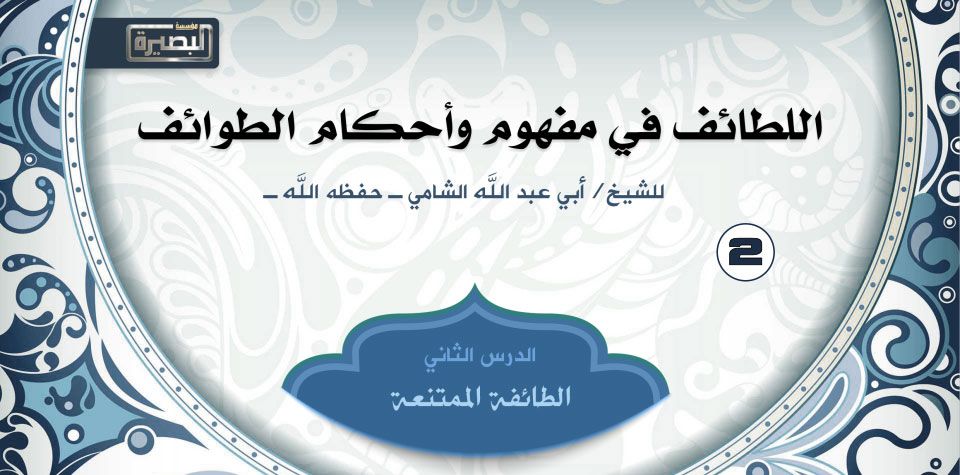
Click the following link for a safe PDF copy: Shaykh Abū Basīr al-Ṭarṭūsī — “Do You Recommend Joining Jabhat al-Nuṣrah?”
_____________
To inquire about a translation for this article for a fee email: [email protected]
Category: Jabhah al-Nuṣrah
New video message from Jabhat al-Nuṣrah: "Nuṣayrī Planes Bombing Infrastructure in the City of Idlib After Its Liberation"

_______________
To inquire about a translation for this video message for a fee email: [email protected]
New statement from Jabhat al-Nuṣrah: "Invitation and Advise To All the Mujāhidīn Factions In Blessed Eastern al-Ghūṭah"

Click the following link for a safe PDF copy: Jabhat al-Nuṣrah — “Invitation and Advise To All the Mujāhidīn Factions In Blessed Eastern al-Ghūṭah”
______________
To inquire about a translation for this statement for a fee email: [email protected]
GUEST POST: A Strong Ahrar al-Sham Is A Strong Nusra Front
A Strong Ahrar al-Sham Is A Strong Nusra Front
By Maxwell Martin

Members of Ahrar al-Sham and the Nusra Front at a public reconciliation meeting affirming their allegiance
Following the merger of two of Syria’s most prominent Islamist insurgent groups (Suqur al-Sham into Ahrar al-Sham), some commentators concluded that they were moving to counterbalance the Nusra Front, al-Qaeda’s official Syrian affiliate. But are Syrian Islamists interested in countering the al-Qaeda affiliate or will they enable it by bringing its behavior more in line with Syrian revolutionary values?
Ahrar al-Sham and the Nusra Front on a collision course?
After Ahrar al-Sham, a highly influential salafi armed group in Syria, absorbed allied Islamist faction Suqur al-Sham last month, a number of observers noted that the move appeared designed to “counter” the growing power of the Nusra Front, al-Qaeda’s official Syrian affiliate. “Are Syrian Islamists moving to counterbalance al-Qaeda?” asked Charles Lister in a recent column for the Brookings Institution. Answering this question in the affirmative, Lister added that Islamist groups actually share some fundamental objectives with the United States and its allies, among them, “to combat extremism and re-assert Syrian values of equality across ethnicity and sect.” Suleiman al-Khalidi, writing for Reuters, noted that the merger between Ahrar al-Sham and Suqur al-Sham “counters al-Qaeda’s clout,” later describing Ahrar al-Sham as a “rival” to Nusra.
Why would Ahrar al-Sham be moving now to counter Nusra, one of its closest allies in the fight against the Assad regime in Syria? Ahrar al-Sham, the argument goes, has grown uncomfortable with Nusra’s increasingly assertive behavior, particularly in the north where the group has, since July 2014, attacked and destroyed several more moderate Western-backed groups, withdrawn from joint governance schemes with other rebels, and established an exclusivist jihadi-only court system that rules according to a constrictive interpretation of Islamic law that is out of sync with local sensibilities. Ahrar al-Sham and its Islamist allies, being both more representative of the local population and more moderate, therefore have an interest in checking Nusra and preventing it from turning into a copy of the Islamic State.
Battlefield symbiosis
Some readers of those arguments may have found it curious, then, that only two days after the Ahrar al-Sham merger purportedly aimed at countering Nusra, both groups teamed up to achieve the most important rebel victory in more than two years: the takeover of Idlib city from the regime, only the second provincial capital to fall completely into rebel hands. The victory was a boon to both groups, extending their influence and territorial control while boosting rebel morale after a series of setbacks. For Nusra, the victory was especially important: it had gained an important foothold in the largest rebel-held city in Syria not controlled by the Islamic State and in so doing had demonstrated its anti-regime credentials in spectacular fashion. The victory brought it and al-Qaeda one step closer to reclaiming the mantle of global salafi-jihadism after having lost much ground to the Islamic State between summer 2013 and fall 2014. And it would have not been possible without Ahrar al-Sham.
What are we to make of this? Can we reasonably describe Ahrar al-Sham as “countering” the Nusra Front when both groups have and continue to feed off each other’s successes?
A different kind of countering
The answer to this question requires us to more carefully specify what we mean when we say that Ahrar al-Sham is moving to “counter” Nusra or that it will act as a “counterweight” or “counterbalance.” Specifically, we can think about two important ways in which Ahrar could counter Nusra. First, Ahrar could act as a strategic counterweight by working to alienate the latter from the broader insurgency. We can call this “strategic balancing.” This type of countering would entail, at a minimum, cutting ties with the Nusra Front and abstaining from any action that helps it expand its territorial reach and garner popular support. At a maximum, it would include actively degrading the Nusra Front militarily. This is what would be required of a group committed “to combat extremism and re-assert Syrian values of equality across ethnicity and sect.”
However, Ahrar al-Sham could also act in a much more limited capacity and provide a check on certain Nusra behaviors, particularly on the local level and in terms of the group’s treatment of civilians. We can call this “local balancing.” In local balancing, Ahrar al-Sham would seek to bring Nusra’s behavior back in line with Syrian sensibilities and within the bounds of revolutionary acceptability. In this case, Ahrar al-Sham could counter Nusra’s increasingly assertive, extremist and unilateral approach to ruling rebel-held territories. But Ahrar al-Sham in this case would not be preventing the Nusra Front from extending its presence and influence into new territories, participating cooperatively in governance, maintaining bases and training camps, and carrying out da’wa—religious outreach and indoctrination—activities with local populations. In other words, Ahrar could counter some Nusra behaviors with which it does not agree, particularly in governance, but not the group itself.
More convergence than divergence
So what is the state of the Ahrar al-Sham-Nusra Front relationship—strategic balancing or local balancing? The evidence indicates that it is the latter, not the former, meaning Ahrar al-Sham’s behaviors are not likely to help root out al-Qaeda in any meaningful sense from the insurgency or to prevent Nusra from continuing to expand its influence in Syria. What it is likely to do is to keep Nusra’s most regressive tendencies in check (possibly helping it generate more popular support and legitimacy than it has already garnered).
The main source of friction of late between the two groups indicates Ahrar al-Sham will tend toward local balancing. Much of Ahrar al-Sham’s apprehensions are a result of Nusra’s behavior in the north and its approach to governance, represented in Dar al-Qada, its jihadi-only court network that is strong in much of Idlib and parts of Latakia and Aleppo provinces. Since it was established in July 2014, Dar al-Qada—which is in most cases directly subordinate to the Nusra Front with allied (and even more extreme) jihadi factions such as Jund al-Aqsa participating—has aggressively instituted a range of extreme legal and social codes that other groups, including Ahrar al-Sham, have been loath to implement. The list of reported abuses that Dar al-Qada, Nusra, and its allies have committed is lengthy and includes whipping a man in July 2014 for cursing religion, publicly shooting two women in a single week for prostitution, stoning a man and woman for adultery, forcing Druze communities in Idlib to convert to Islam, raiding an opposition radio station and women’s center in Kafranbel, and beating several women and activists in addition to lesser forms of extremism such as forcing cafes with billiards, computer games, and foosball to close.
On the ground, Ahrar al-Sham contingents have been opposed to these practices and have worked to prevent them from spreading. The Islamic Commission, an Ahrar al-Sham-backed governance body that includes a network of courts, does not implement such regressive regulations. Its courts mostly implement the Unified Arab Code, a written interpretation of Islamic law that more extremist factions reject. Ahrar al-Sham-backed courts have ignored some of the harsher regulations such as stoning and hand
New video message from Jabhat al-Nuṣrah: "Scenes From the Control of the Mujāhidīn of the Southern Checkpoint to the Town of Kafr Shams in Rural Dar'ā"

________________
To inquire about a translation for this video message for a fee email: [email protected]
New video message from Jabhat al-Nuṣrah: "Scenes From Shaykh 'Alī Health and Charity Center Established By Jabhat al-Nuṣrah To Serve Our People the Muslims in Rural Western Aleppo"

________________
To inquire about a translation for this video message for a fee email: [email protected]
New statement from Jabhat al-Nuṣrah: "About the Ongoing Fighting in al-Yarmūk Refugee Camp"

Click the following link for a safe PDF copy: Jabhat al-Nuṣrah — “About the Ongoing Fighting in al-Yarmūk Refugee Camp”
_______________
To inquire about a translation for this statement for a fee email: [email protected]
GUEST POST: The End of al-Qaeda
NOTE: As with all guest posts, the opinions expressed below are those of the guest author and they do not necessarily represent the views of this blogs administrator and does not at all represent his employer at the Washington Institute for Near East Policy.
Jihadology.net aims to not only provide primary sources for researchers and occasional analysis of them, but also to allow other young and upcoming students as well as established academics or policy wonks to contribute original analysis on issues related to jihadism. If you would like to contribute a piece, please email your idea/post to azelin [at] jihadology [dot] net.
Click here to see an archive of all guest posts.
—
The End of al-Qaeda
By Aimen Dean
Sources within Ahrar al-Sham stated that their allies in Jabhat al-Nusra have told them that AQ leader Ayman al-Zawahiri will relinquish his authority – or what left of it – over AQ branches globally and absolve them of their allegiance to him. The move was in response to the rising power of Islamic State in Iraq, Syria, Egypt, Libya and Nigeria as well as new IS incursion into Yemen. AQ and Zawahiri can no longer offer any meaningful leadership and the trend among the two strongest and largest AQ branches (al-Nusra and AQAP) is that the association with AQ is no longer an asset when it come to local conflicts in Syria and Yemen, instead it is a hindrance and a liability.
While Zawahiri and AQ central command have been ineffective and side lined since the start of 2014 and with the rise of the IS, nevertheless they provided moral and legitimate voice for al- Nusra and AQAP in the face of IS expansion. The immediate implication for such move (once it happens) is that al-Nusra would be free to establish wider alliances within Syria and open the door again for its plans for an Islamic Emirate in northern Syria after Idlib was taken with the help of Ahrar al-Sham. The move will also help AQAP to abandon the al-Qaeda name and adopt once and for all the new name of “Ansar al-Sharia”. Both groups possess their own funding mechanism and have been (for several years) free financially from al-Qaeda Central Command. Nonetheless dissolving al-Qaeda will be seen as the end of an era and the beginning of a new chapter for both al-Nusra and AQAP (Ansar al-Sharia). AQIM were already dissolving and merging with other regional groups across the Sahara/North African region, therefore there will be limited strategic or logistical impact from this announcement.
Aimen Dean is a founder member of al-Qaeda, who changed tack in 1998 and became a spy for Britain’s security and intelligence services, MI5 and MI6
al-Baṣīrah Foundation for Media Production presents a new video message from Jabhat al-Nuṣrah’s Shaykh Abū ‘Abd Allah al-Shāmī: “The Subtleties in the Concept and Provisions of the Sects #2”

_______________
To inquire about a translation for this video message for a fee email: [email protected]
New video message from Jabhat al-Nuṣrah: "Targeting Nuṣayrī Army Sites in al-Masṭūmah With Heavy Weapons"

__________________
To inquire about a translation for this video message for a fee email: [email protected]
